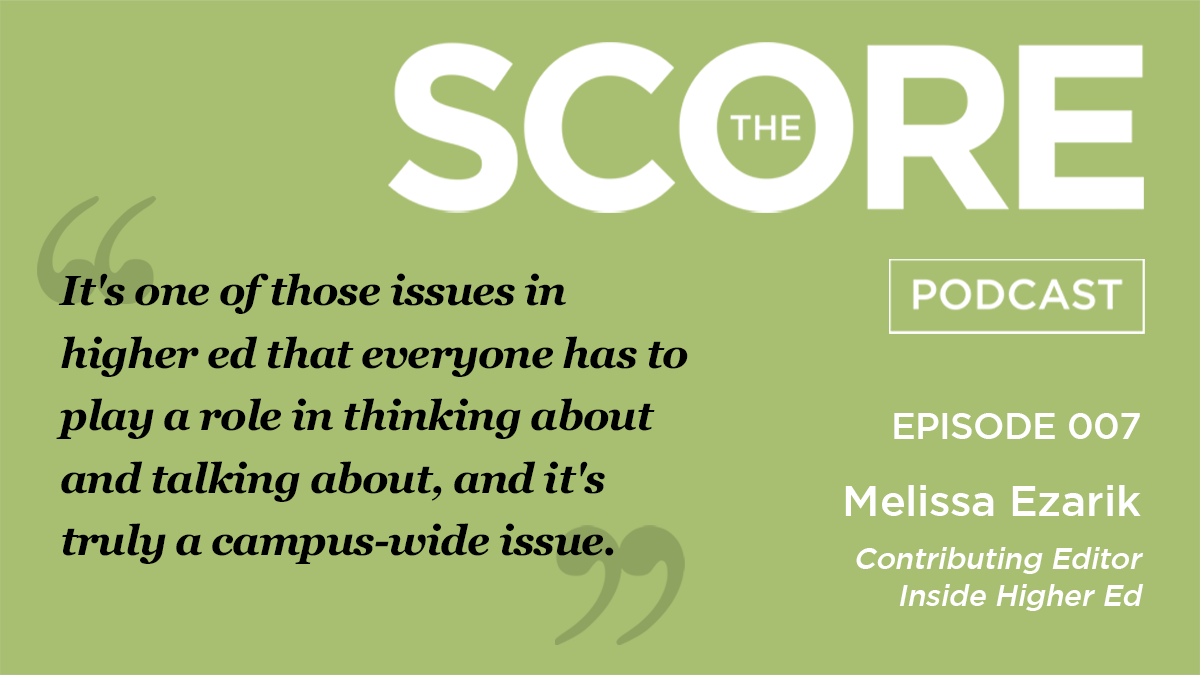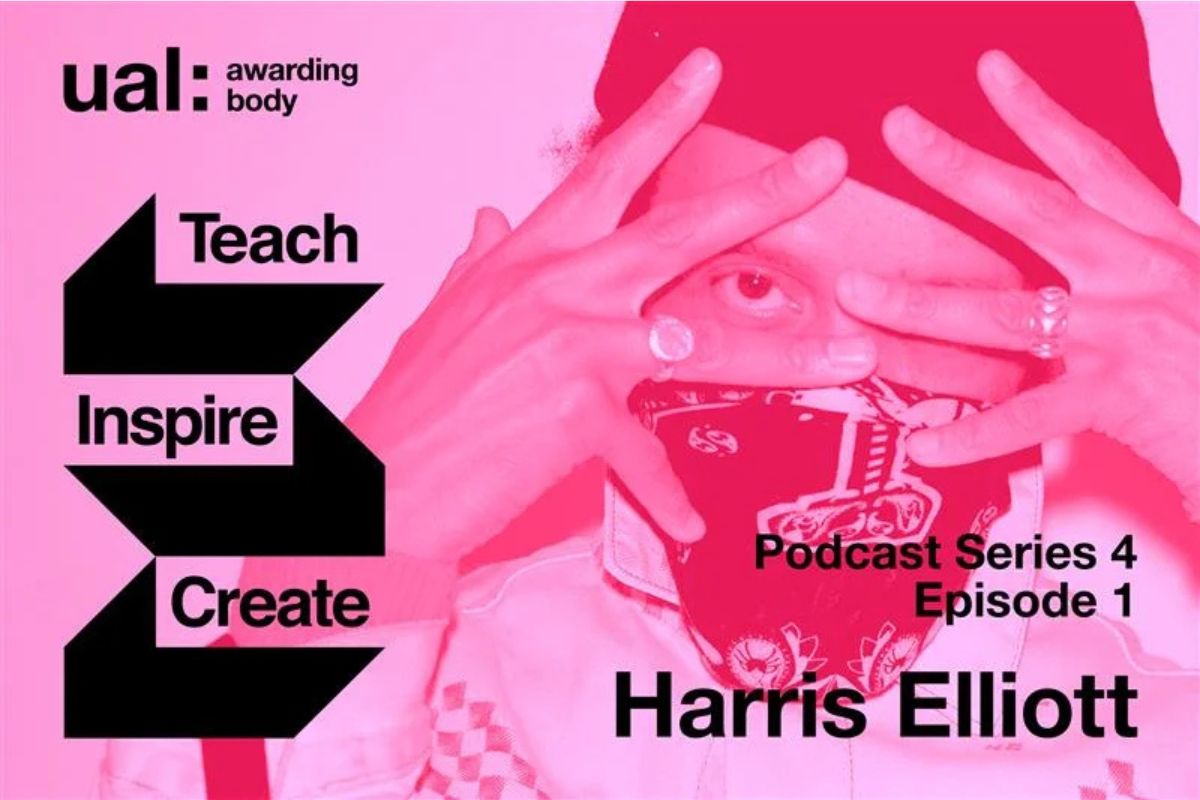Student Behavior Survey Results The Score Podcast

In Episode 007 of The Score Podcast, host Kathryn Baron (@TchersPet) interviews Melissa Ezarik (@MelissaEzarik), contributing editor at Inside Higher Ed, where she manages survey-based content for the Student Voice news hub. In a series of articles covering their survey about student behavior adds another dimension to how student perceptions about cheating and college affect their conduct academic integrity.
Read on for the high points of the conversation. And listen to the full episode Apple, Spotify, and The Score Website. Note: Removal of filler words and minor edits have been made for clarity.
Kathryn Baron (01:35): So first question, and since we’re talking about cheating, no peeking, what is your biggest takeaway from the survey that you recently published? What surprised you about it?
Melissa Ezarik (01:48): Let’s see. So, I think it would have to be all the gray areas. In fact, one of my analysis articles I think was called Shades of Gray on Student Cheating. We asked how acceptable various activities were to students, and just to have examples, only seventeen percent said it’s acceptable on some level to use unapproved technology tools during an online exam, and that’s an indicator that over eighty percent of students likely wouldn’t cheat on their exams, or at least not most of the time.
But when asked about the ethics of, say, using a search engine to get answers on homework, students are a lot more likely to say it’s acceptable. Only ten percent say Googling on homework is unacceptable. One student wrote that small assignments actually should not be of concern to faculty in terms of cheating. Thought that was interesting.
Another surprise to me was getting perspective about low numbers of reports for cheating. Professors are definitely under-reporting cheating for a variety of reasons. That includes that they don’t trust the systems in place to manage accusations, or maybe they worry the institution may be too hard on a student, or they may just think that reporting will reflect badly on them as an educator.
Kathryn Baron (09:40): Would you say that those are the students who don’t want to cheat and are really happy that there are better ways to identify students who are cheating so that the students who actually studied, their grades don’t suffer because someone else cheated to do well and they studied and they get a lower grade?
Melissa Ezarik (10:04): So, one student had done a group project and her peer had asked for a little bit of help with the introduction that he was struggling with, and that was the piece that he was getting graded on. And so, she typed some thoughts into a Google Doc and said, “Maybe you could get started something along these lines,” and he wound up submitting that just as it was as the introduction and he got credit for it. In fact, he got a better grade for his part than she got for her part. And it was so frustrating to her not only that he did it, but that when she tried to point it out to the professor, he basically didn’t believe her. I think she said he even laughed at her.
She went to the Google Doc. She said, “You could see my name is the only one as an editor or an author here in the history,” and basically nothing was done and she was not happy about that. But one nice thing is that she channeled that energy in a positive way and now she’s part of the honor board, so she helps to maintain academic integrity at their institution.
Kathryn Baron (10:59): Well, that definitely speaks to the need that some faculty and students say for a common policy across the campus that this is how it’s going to go. I think right now, in many places, it’s up to the professor and nobody really has oversight. That’s probably really difficult for some of them.
I don’t know. Did they discuss that? I mean, in this situation, this student did, but did you see other similar kinds of concerns?
Melissa Ezarik (11:30): I think we saw some write-in comments to that effect, that it’s not fair that the professor might handle it one way for one student, a different way for another student. If you don’t have strong policies in place, just how much a professor has a connection to a particular student, some sort of rapport built already may make a determination whether he or she reports or what the consequence would be, if you did cheat.
Kathryn Baron (12:23): I think that one big question though is, why do students cheat? I don’t think that your survey asked that directly, but it did ask why students in general might cheat, and I’m wondering if you can talk about that. What are the factors that they say today lead them to cheat, even if they don’t see themselves as a cheater?
Melissa Ezarik (12:47): Sure. The top response that we found is something that was a contributor to academic cheating, according to students, was pressure to do well, and that’s from family or academic requirements. The second biggest reason was lack of preparation for exams and who’s that on? That’s on the student for that one. And the third was heavier unrealistic course loads, and the fourth was actually the opportunity to cheat. So, “It was there, so I took it.”
One expert that I spoke to framed it as, everyone has their price. It’s stress or family pressure, time constraints. Everyone’s got some sort of breaking point, and most students are able to reach that breaking point over the course of a particular semester, is his thought.
We didn’t ask this directly, but experts noted that there’s a shift from most students going to college to develop the meaningful philosophy of life, and now it’s most students going to college to get a job. So you’ve got that extrinsically motivated focus that sets the scene for more cheating.
“It was there, so I took it.”‘
— Student response from survey
Kathryn Baron (14:32): That’s true. One person I spoke with said college is now transactional, in part because it’s so expensive. “Well, I’m giving you $60,000, and I expect a degree.” That’s the way it goes. And they do want the job. They want a better job. They want a better chance of getting into grad school, that type of thing.
Kathryn Baron (15:29): But research does indicate that stress, anxiety and depression are off the charts, especially since the pandemic started, and I’m wondering what your thoughts are on this. Are we as a society and as colleges and universities ignoring a huge mental health problem that’s really contributing to this situation?
Melissa Ezarik (17:14): I’ve got another quote from a student that relates to stress that I thought was interesting. The student says, “Stop assigning work as if students are only taking that one class and dedicate their entire life to school. Many students are taking multiple classes on top of having a job, extracurriculars, events, networking, possible illnesses, families and loved ones to take care of. People sometimes have to make compromises and sacrifice a grade in one class to do better in another because there’s only so much time in a day. If people didn’t feel like they have to compromise, perhaps they wouldn’t feel so compelled to cheat or to use shortcuts.”
Kathryn Baron (19:33): The survey also asks what students say is helpful to them in terms of learning, maybe even adjusting to college, and what did they say about that?
Melissa Ezarik (19:48): Well, we asked students first of all how they feel about how cheating accusations are handled on their campus, and the majority at least somewhat agree, actually. I think it’s 8 in 10 would agree that it is handled fairly. So, I think that says a lot about them wanting to be aware of what systems are in place for when the accusation is made, so they would find that helpful to know.
Melissa Ezarik (21:34): UC San Diego, actually, if anyone gets accused, they complete an academic integrity seminar that’s on making better ethical decisions. And they actually get assigned a coach of some sort to work through with them what went wrong. How could we prevent this from happening again? And then if no more violations come up, even if they’ve been suspended for it, the suspension gets canceled. So, there’s the idea that you can prove that you do want to be a member of this community, you want to uphold academic integrity, even if you’ve made a mistake.
Kathryn Baron (24:32): Do any of the colleges and universities, have they tracked it to see – such as UC San Diego – if their rates of cheating are decreasing as a result of some of these efforts?
Melissa Ezarik (24:46): I think what I heard from my interviews the most is that reports increase a lot once awareness goes up, and in some cases that’s encouraging faculty to actually make a report. But that doesn’t mean that the outcome is that a student is getting a consequence in any way.
Kathryn Baron (25:56): You were talking about honor codes, and from what I’ve read and heard from folks that again, just like with what is cheating and how to address it, there’s really not a consistent definition of what is a good honor code. And some schools say we have an honor code, but other schools would say, “No, that’s really not, and it’s not going to be effective at all.” Have you heard anything to that effect?
Melissa Ezarik (26:28): Unfortunately, I don’t think there’s any template out there, and that’s probably just because there’s some disagreement on what to include in it, perhaps. You have individual teachers having students sign honor codes that are on the syllabus. Some teachers that maybe are more focused on this concept in general and making sure that students truly get what the expectations are of them.
Kathryn Baron (27:19): Right. You were talking about students saying how easy it is. One student I read, and maybe this was from one of the student comments that you received, “If they didn’t want us to cheat, they shouldn’t make it so easy.” So, I thought that was an interesting way to look at it.
Melissa Ezarik (27:41): I feel like in general, we see a lot of responses that relate to, “Well, if you weren’t doing this in this way, I wouldn’t be doing this in this way.”
Kathryn Baron (27:50): So, they’re not really taking responsibility. They’re saying it’s the school’s fault. I don’t know. I mean, that’s what it sounds like in a way. “Make it hard for me, and then I won’t do it.”
When you were talking about authentic assessment, I think one thing that came to mind which I believe you also wrote about was; if you’re a professor who’s been using the same exam for 10 years, you are asking for it, I think, because students talk to each other. That’s just the way it is.
Melissa Ezarik (28:23): Yes, absolutely. One of my experts said that you actually could still do a multiple choice test that’s better designed to be more authentic. It’s just changing it up and making students think a little bit differently about the way that they may come across their response.
Kathryn Baron (28:40): Yeah, it looks like it’s something that needs to be addressed from many sides, that clearly as we’ve talked about on The Score, it’s not a singular problem. There’s not one reason students cheat, and therefore, there’s clearly not one way to deter it. Is that your sense?

Melissa Ezarik (29:06): Yes. It’s absolutely a multifaceted problem. Like any behavior, if there’s multiple reasons for it, solving it is going to be complicated. And the reasons for cheating are very individualized, even though we see some trends pointing towards some reasons more than others.
I have one other quote from a student I think may be helpful to share, and this relates to professors handling things themselves and what kind of situation that creates. This is a pretty scary quote to read, and it’s just disheartening. That student says, “Professors are not reporting it, but are instead handling it themselves, and this leads to unfair situations where students are punished and get no chance to petition against the allegations. The current way my campus is handling this almost caused me to take my life last fall.” And this is a person who’s a senior now. So, they pointed out that they know what college is like. “It’s unacceptable to punish students for trying to pass classes by working together or using resources outside of class to help with homework. If students need outside material and are spending the time looking for it, maybe it’s a shortcoming of the professor that’s causing it.”
Kathryn Baron (31:07): Do you feel hopeful that colleges and universities are beginning to take this seriously, and really putting more effort and even money into looking at how they can deter students from cheating in the first place and how they can help them with schooling, with their education so that they don’t feel a need to cheat?
Melissa Ezarik (31:39): Certainly, it’s getting more attention ever since the pandemic started. Everyone is assuming that cheating is easier online, even though it’s possible in either environment. I was disheartened to learn that so few schools have students as part of the process if someone is accused. To me, that just seems like a no-brainer that of course they’re understanding their peers and being part of that decision making body makes so much sense.
I think it’s one of those issues in higher ed that everyone has to play a role in thinking about and talking about, and it’s truly a campus-wide issue. It’s not just an issue for professors or for deans to be thinking about. The student experience is so challenging these days, and this piece of it can be given more thought for sure.
Listen to the entire episode 007 of The Score with guest Melissa Ezarik here.
Check out Melissa’s two articles in Inside Higher Ed about academic dishonesty here and here.








Responses